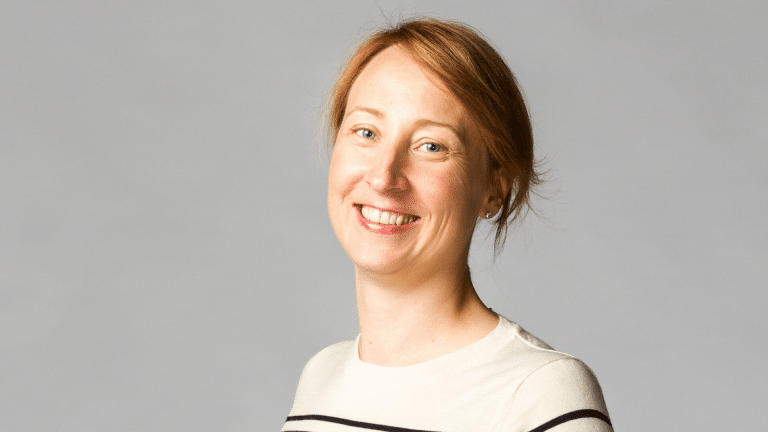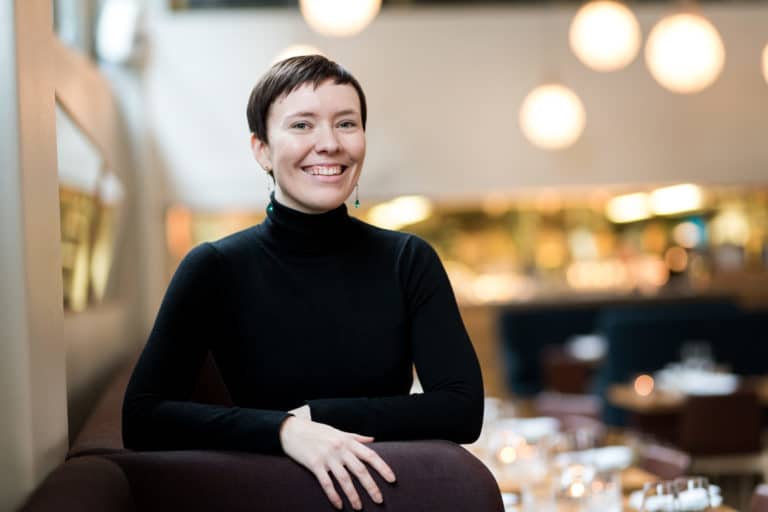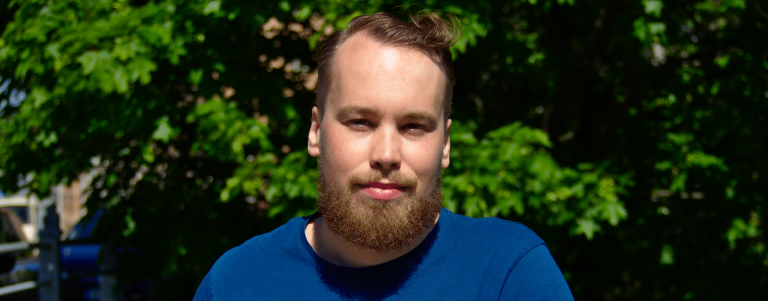The more I read about marketing, the more I wanted to work in marketing.
I grew up in a small beach city in Vietnam named Vung Tau City. It is a small quiet city, but it is not dull. When I say it is small, it is small compared to other big cities like Saigon or Bangkok, not Helsinki.
I don’t remember much about how I was as a child. Most of my childhood memories are filled with days of studying – studying in schools, cramming classes, and studying at home: the typical Asian kid’s childhood. My parents were very strict. Besides studying, I spent a lot of my free time reading and daydreaming. I was an introvert growing up, and I still am.
As a child, one usually has a lot of dream jobs, right? Me, I dreamt of working in a bookstore because I thought I would be able to read a lot of comics and books during my working time. Then I wanted to be a scriptwriter, a novelist, etc. At the end of junior high school, I came across a magazine about success stories in Marketing. By the end of junior high school, I decided I wanted to work in marketing and advertising. The more I read about marketing, the more I wanted to work in marketing.
My parents had always taught me about job security, and that entrepreneurship was a high-risk game
I never thought about becoming an entrepreneur until the moment I registered the company. My parents had always taught me about job security, and that entrepreneurship was a high-risk game. Funnily enough, my grandpa was a very successful entrepreneur. However, he passed away years before I was born, so I never got a chance to ask him about his entrepreneurial experiences.
From the stories that my father and my grandma told me, his entrepreneurial journey sounded inspiring but with a sad ending. He came to Thailand as a poor immigrant job apprentice. He worked very hard and used all his savings to build his own business. It took him a lot of time, life savings, and effort to build his successful corporation in Thailand and Vietnam.
My father’s family never talked about the details of what happened in their business tragedy
But then he lost everything because of the war and political land reform policy in Vietnam during the 1950s. After that significant loss, my grandpa was depressed until the day he passed away. My father’s family never talked about the details of what happened in their tragedy.
Given such past experiences, my family has mixed feelings about entrepreneurship. Meanwhile, I read stories about other self-made entrepreneurs, and I was so amazed by the impact that they have had on society. Therefore, to me, the link to entrepreneurship is a mix: inspiring, unrealistic, exciting, scary, and sad.
The food businesses in Japan were operated in a creative, efficient, detail-oriented, and innovative way
Years ago, I applied to the Master Program of Entrepreneurship at Aalto after my bachelor exchange program in Japan. To be honest, I didn’t think a lot about my Master’s program at the time.
When I went to Japan for this exchange program, I really liked the country. During my time there, I was fascinated by the way food businesses in Japan were operated: creative, efficient, detail-oriented, and innovative. I also enjoyed observing the operation of restaurants and other types of food businesses there. At some point, I thought, ‘oh my, one day, I want to recreate this model in either Finland or Vietnam,’ or ‘I wish I can try this idea in Finland.’
I wanted to learn the problem-solving trait of entrepreneurs
Coming back to Finland after this exchange, I thought about the next step after my Bachelor’s Degree in International Business at Aalto University. I applied to a few Master programs in Helsinki and Copenhagen. When I saw that Aalto had a relatively new Master’s program in Entrepreneurship, my memories of Japan came flooding back. Therefore, I applied to the program out of curiosity. That’s how I went on to study Entrepreneurship.
While I was studying Entrepreneurship, I still thought that the program helped me to work better in companies or fast-growth startups. I wanted to learn the problem-solving trait of entrepreneurs.
I shifted from working in traditional marketing to digital marketing for software startups in 2013. I always like to see how ideas can help us improve or solve problems, and on top of that, I am interested in the progress of executing a new idea and see how it works. Working in software startups has made me realize that I really like the spirit of startups: if you have new ideas, then just do it. Fall, rinse, repeat.
Restaurant workers are the artists in the most hidden stage
Around 2016, I started doing more freelance work and side projects to expand my marketing skills and industry knowledge. As I was very passionate about food, I chose to get more involved in food-related projects like Footbridge (an Australian food marketplace startup), a meat substitute food project for Fazer, local restaurants, etc.
As a foodie, I felt joy when working on marketing materials for food. And I had so much fun talking to people in the restaurant industry. They are dedicated, outspoken, down-to-earth, and interesting people. I never get bored talking to them about food. They are the artists in the most hidden stage.
If the idea sucks, I want to see how it works in real life, not just in my mind
The more I worked with the restaurants, the more pain points I recognized that restaurants had to face. It was sad to see many dedicated chefs/restaurant owners having to close their restaurants not because of the food they cooked, but because of marketing challenges. I realized the lack of existing technology tailored to restaurants that can help many restaurant businesses grow. Although there are many food apps, the restaurant industry is still considered underdeveloped in terms of digitalization according to Harvard Business Review. And my wish was to create a game changer tool for restauranteurs to run their own marketing.
Day by day, the idea for our product, Snappmeal, was incubated in my mind and my notebook. Until a day, I wanted to see the vision come out of the notebook. I thought, “if the idea sucks, I want to see how it works in real life, not just in my mind.”
My residence permit at that time was tied to work employment
I knew being an entrepreneur was risky and challenging for a non-EU immigrant in Finland regarding residence permit and finance. My residence permit at that time was tied to work employment. I received headhunting calls from companies both within and outside of Finland, and I was optimistic that job-seeking seemed to be less of a struggle.
I was also saving to settle down in Finland. Therefore, it took me quite a while to sleep on the decision. One day, while sitting in the sauna, I finally decided to pursue the idea of leaving my current job and exploring my entrepreneurial path. That’s how I decided to quit my job and worked on founding the company.
It would be nice to have enough money and fund my idea faster
Thinking back, I think I was still a bit naive then. It would probably have been better if I had started the startup idea as my side project first to ensure I had enough money to fund my idea faster. Either ‘all in’ is pretty much my trait, or I am the person who prefers to let life teach me.
Speaking of support, I received both encouragement and concerns from the people closest to me. My cousin in Vietnam was very supportive. On the other hand, my family did not know about my entrepreneurial journey from the beginning, as I didn’t want to worry them.
Living with an entrepreneur is not easy, to be honest — financially, emotionally, and mentally
Remember what I had said earlier about my childhood, right? However, when they knew about it, they were supportive but were still very worried about me. “How can a small girl survive in a foreign land chasing big dreams?” said my dad.
I told him, “You always want me to go back to Vietnam. So, the worst scenario is that I fail, go bankrupt, and go back to Vietnam to live with you. Is that a happy ending? Haha.” My friends and my boyfriend’s family were also supportive. Among all, my boyfriend Joona was the most supportive and understanding. Living with an entrepreneur is not easy, to be honest–financially, emotionally, and mentally. Yet, boom! He got the ‘jackpot’ that no one wishes for!
I started alone
First, I started alone, and my goals at that time were building a team and bootstrapping my product idea. The first person to work with me was my cousin in Vietnam. She was like my partner-in-crime. We worked together on a lot of different things.
In the beginning, I understood that my personal savings were too little for me to build a team, develop the product, and grow users. So, under the name of Aurabear, I started with the marketing service first, as I would be able to utilize my professional experience while finding my tech co-founder and building a founding team.
I found my co-founder after pitching many times
I also hoped that the payment from marketing projects could help us self-fund building the platform for Snappmeal. When I was building the marketing service branch for Aurabear, I went out to seek a tech co-founder.
After pitching to several of my connections and several networking events, I was happy to find a tech co-founder. He was actually the husband of my teammate. Helsinki is small. He is a superb software engineer with a business mindset. This made our discussion flow even more smoothly.
I also got chances to know more about myself thanks to silly mistakes
For the marketing service branch of Aurabear, we focused on helping early-stage startups with high-quality execution and affordable budgets. That’s how we shaped the mission for Aurabear. At Aurabear, we want to build meaningful products (our first product was Snappmeal) and help other startups grow faster via marketing services.
As a first-time founder, I could have done a number of things better to go faster and further. I consider the mistakes as lessons and experiences for me. I also got chances to know more about myself thanks to silly mistakes.
Acknowledging the difficulties of being an underrepresented female founder has led me to research more on possible hindrances and find more ways to improve my chances
For entrepreneurs, especially foreign entrepreneurs, there were tons of obstacles in setting up the company, identifying the business model, and especially acquiring the first customers. In the beginning, I didn’t want to see myself as an underrepresented female founder, as some had pointed out.
But later, I acknowledged that point about myself. The reason is that as I acknowledged that, I came to research more on possible hindrances for underrepresented female founders. From there, I could find more ways to improve my chances.
Another obstacle: I am an introvert
Another obstacle had more to do with me: I am an introvert. I don’t have many friends in Vietnam or Finland. If one has good connections and a big network, utilizing one’s connection is a good head start. For me, however, my network in Finland was so small. The language barrier was also a challenge for me when I tried to find clients for our marketing service and our restaurant platform, Snappmeal.
There are other obstacles, such as understanding the laws in a foreign country, communicating with my team, wearing many hats, etc. On top of that, testing my product and finding product-market fit with a young team without funds is the biggest challenge, as I am not an experienced manager. I have told my team many times: Bear with me, I am learning to keep us from being like kids running the house.
I just jumped in the Facebook post and pitched
About the first deal – our first-ever deal – the client was a consulting company in the U.S.A. Interestingly, I got the deal from a Facebook group named Bossmoms that I joined. I joined the group though I was not a mom… The truth was I called myself “da boss.” I saw a post of a company seeking for email marketing service on that group. I had nothing built up yet, but I just jumped in and pitched.
Our company had nothing to show back then: the company registration was still not yet approved. Therefore, I decided to ‘fake it till you make it’ by using my freelance work portfolio and putting my company logo there.
I remember all the first times
It was not fake, as it was just me all along. But still, it felt different to pitch as a freelancer versus as a team. It was my first time doing a sales job as an agency owner, and it was an interesting and exciting experience.
In general, I remember all the first times: the first time we made the first deal for Aurabear marketing service, the first time we released our Snappmeal app to app stores, and the first time we saw the first restaurant business user and the first app user, etc. All these were exciting and happy memories for our team. For us, the daily ‘spark joy’ moment is seeing a new user or just a small spike in user activity.
We rolled out user interviews every two months and polls every week
It has been a year and a half now. Our team has been working very hard and hit several milestones. We have been providing marketing services for several long-term partners, helping them solve their marketing problems. Seeing our clients achieve their goals and tremendous results are the most satisfying moments for us. Every single project!
Within two months, we built and released our Snappmeal MVP in the business app (web app), and consumer app in Android and iOS. We built fast and improved fast. Our tech team is still young but talented, fast, and agile. We rolled out user interviews every two months and weekly polls on the app to collect what users like to see in our app.
For both our product team and marketing team, building a customer-centric platform is our ultimate goal. During the first months we released a beta version, we had the opportunity to collaborate with the team in City.fi at global and nation-wide food festivals like Lux Helsinki Eat 2019, Syö! 2019, and 2020. Our team also ran the Asian Restaurant Week to help raise more awareness about Asian restaurants, as it seemed that people showed hesitance to go to Asian restaurants in early 2020.
We help restaurants game up their marketing
Our team is a foodie team, so we want to build the Snappmeal app to be a fun and engaging platform that brings values for the foodie community in Finland and worldwide. We want to develop the business app as the smart, easy-to-use, effective tool for restaurants to game up their restaurant marketing. So they can increase sales without exceeding their marketing budgets.
Depression among entrepreneurs is real
The mission and passion for food is the driving force behind our work and persistence. Running a marketplace platform on a small budget is tough for the founding team. You need to build products for two sides—supplies and demands and grow users fast on both sides.
In order to survive in an expensive country like Finland, our team had to work several jobs to survive. Some of us got burnt out (including me). I felt sad and kept guilting myself for letting it happen to other people in the team. I fell into depression. I had always been a happy person, but then I realized that the depression among entrepreneurs—which I studied in my Master’s program—is actually real.
Stay focused!
Speaking of lessons, I have experienced difficulties in dealing with paperwork and accounting, at which I am very bad. It is very important to find a good accountant to start with. I learned it the hard way.
The second lesson for me is that I spread myself and my team too thin. We did client projects, marketing for Aurabear as an agency, and built and grew Snappmeal. This was too much for a small team. Knowing how to stay focused is what I am learning.
Crisis and risk management are essential
Crisis management is the next lesson. Our Snappmeal beta version had just been launched in December last year, and when we were ready to grow, restaurants had to close because of the pandemic. We tried to support restaurants by letting them use the app for free from March till the end of June.
Besides, we optimized our platform for take-aways. However, this also meant that we had to accept receiving no income from Snappmeal for months. For a bootstrapping project, suddenly, we fell into the situation of having no financial support. Crisis management and risk management were the lessons I encountered and am still doing my best to learn.
I like the process of building new things from scratch
Nature or nurture? I think I am learning to become an entrepreneur, not a born entrepreneur. And I am still an apprentice entrepreneur. What I like about entrepreneurship is the freedom to test new ideas and build my dream team.
I like the process of building new things from scratch, and entrepreneurship has created opportunities for me to pursue that passion. Being an entrepreneur has also pushed me to situations that help me recognize my strengths and shortcomings. I was not pushed into those situations when I worked in stable jobs.
Being an immigrant and entrepreneur in Finland is pretty tough
There are many things I don’t like about entrepreneurship, of course. I don’t know about other entrepreneurs’ situations in Finland, but for me, being an immigrant and entrepreneur in Finland is pretty tough.
High living costs in Finland and little income has made my personal life more difficult to get by. Besides, being an entrepreneur, one needs to be good at networking and sales, which are challenging for introverted entrepreneurs like me. I am still learning to get out of my comfort zone and improve my networking skills.
Know how to persuade people to believe in your ideas and your team
My answers change from time to time, based on the experiences I have had. Right now, I would say the top three skills I want to improve to be a better entrepreneur are: sales, team management, and crisis management. Having sales skills here means knowing how to persuade people to believe in your ideas and your team.
It is knowing how to sell your ideas and visions to the team, customers, and interested partners. I used to ignore the importance of sales skills as I thought, ‘oh, let the salespeople do their sales jobs,’ which was a big mistake. For entrepreneurs, sales skill is essential. You don’t have a big budget to hire senior sales during the first days; you have to get out there and sell your services/products HARD.
For start-ups that build products, the founders need to build their A-team
For start-ups that build products, the founders need to build their A-team. A mediocre idea plus an awesome team will create an awesome business. And an awesome idea will be destroyed by a bad team. I want to be better at communicating with my team, motivating them, and helping them develop their skills.
For early-stage startups, you will be hit hard by many factors: little financial support, the struggle of finding product-market fit, and many other things that can happen – like the coronavirus pandemic. To survive and grow, the team needs to be resilient and trusting of each other.
The third skill I want to improve this year is crisis management. The pandemic has affected our company’s business severely. It is a wake-up call for me to see the importance of crisis management. I didn’t prepare for the crisis at all. Startups and entrepreneurs are very optimistic; we always think about the positive moments to keep us going. Meanwhile, we forget to think about the worst scenarios to have back-up plans.








